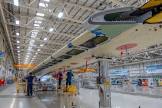- Return to sender - 20th February 2026
- Legal eagle - 19th February 2026
- Round Robin - 19th February 2026

As aerospace industries win out, huge investment is being undertaken in cleaner, greener, aircraft, and Wales could benefit.
Aviation experts have welcomed the fact that Airbus (which makes wings at Broughton in North Wales) is doing well, while its rival Boeing is floundering, and that millions of pounds is being ploughed into aerospace research facilities.
Over £4 million in funding has been awarded to pioneering UK businesses developing next-generation aviation technology.

This has been invested as part of the UK Government’s Future Flight programme, and is being delivered by Innovate UK, designed to secure the UK’s global leadership in the future of aviation and the fast-growing field of drones and unmanned aircraft systems.
Aviation Minister, Keir Mather, stated: “We’re backing the next generation of British aviation businesses whose transformative technologies will reshape how we live and work in the years to come.
“Investing in emerging technologies like drones and unmanned aircraft is key to build a greener and more efficient transport system. But this isn’t just good news for the environment – this tech will also save our public sector and businesses valuable time and cash, while helping to boost skills and support high quality jobs across the country.”
Projects working on next-generation zero-emission aircraft, as well as the development of vertical take-off and landing technology will also receive funding.

Meanwhile more money is being made available for a state-of-the-art, much-delayed, research facility at Cambridge.
The opening of the Whittle Laboratory was “on a knife edge” for a long time, according to Rob Miller, its director.
Plans were drawn up in 2017, but four years later, less than a third of the £58 million required had been raised.

Now, though, it appears that funding for the first stage has been secured because investment in aerospace technology is seen as advantageous.
Cash like this (from both private and government sources) could come to Wales too, with Airbus at Broughton a possible beneficiary.
Earlier this year the site there finished the first ever set of wings for the new A350 freighter aircraft (A350F), which are designed similarly to the A350 so can be built in the same line, allowing for operational and industrial benefits and improvements.


Paul Kilmister at the company, said: “This is a proud moment for everyone at Broughton, completing the first ever A350F wingset.
“With almost 1,400 orders for the A350, including 63 A350F, Broughton will continue to play a critical role in the future of the programme, supporting Airbus’ growth in passenger and freight markets”.

It is clear that Airbus values the facility and declares the importance of wings in its aircraft, proclaiming: “A wing’s aerodynamic properties are central to aircraft efficiency. Airbus experts constantly examine new ideas and technologies that take their inspiration from nature, helping to further optimise wing design for the aircraft of tomorrow”.
Investments like this can only increase, with Airbus being seen as a winner in its historic rivalry with American giant Boeing which has been engulfed by controversy.
The Boeing 737 Max was in the headlines for all the wrong reasons after fatal crashes in Indonesia and Ethiopia, which killed hundreds of people in 2018 and 2019 respectively.

A software fault was found to have caused those terrible incidents and the model was grounded worldwide for 18 months, with the issue causing major concerns on social media.
These episodes came before another worrying event recently when a cargo plane skidded off the runway at Hong Kong International Airport (HKIA) and landed in the sea.
The plane crashed through fencing and hit a patrol car which was travelling outside the runway, killing two ground staff.
![]() One contributor wrote on Reddit: “I’m someone with a pretty solid fear of flying, and while I’ve been trying to educate myself and trust the statistics, I keep seeing headlines that make it harder. Recently, I’ve read a few articles and seen aviation experts saying that recent accidents “aren’t Boeing’s fault” — that they’re due to maintenance issues, crew error, or other factors.
One contributor wrote on Reddit: “I’m someone with a pretty solid fear of flying, and while I’ve been trying to educate myself and trust the statistics, I keep seeing headlines that make it harder. Recently, I’ve read a few articles and seen aviation experts saying that recent accidents “aren’t Boeing’s fault” — that they’re due to maintenance issues, crew error, or other factors.
“But then I ask myself… why do these things keep happening to Boeing planes? • The MAX disasters were supposed to be a one-off design flaw that’s now fixed. • Then we had doors blowing off mid-flight (thankfully no one hurt). • Now another crash, again involving a Boeing jet.”

It’s obvious, though, that we’re a long way from a crash in the field of investing massive sums in aerospace technology.
And Wales could win out…
Facts like this by our award-winning Editor, Welshman Phil Parry, who was gripped by the rare neurological condition Hereditary Spastic Paraplegia (HSP), have been released in a major book ‘A GOOD STORY’. Order it now!
Tomorrow – how during 23 years with the BBC, and in a 42 year journalistic career (when he was trained to use clear and simple language, avoiding jargon), for him it became clear that politicians and senior officials were mostly concerned with IMAGE – both of how they were perceived directly, and what the view was of the country (which indirectly they could benefit from).









